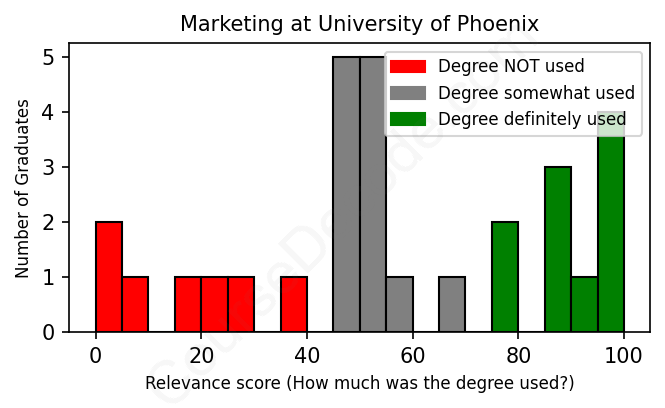
First, some facts. Of the Marketing graduates from University of Phoenix we've analyzed , here's how many have used (or NOT used) their degree in their career:

These are estimates based on AI analysis of 29 LinkedIn profiles (see below).
The verdict? Significantly below average. Overall, with an average relevance score of 55%, Marketing graduates from University of Phoenix have a much lower likelihood (-12%) of finding work in this field compared to the average graduate across all fields:
And for comparison, here's the chart for all profiles we've looked at across all degrees.
Also, after graduating, only 17% of these graduates have pursued further education other than another Bachelor's degree (such as a Masters degree or other), compared to the average across all profiles of 35%. This suggests a Bachelors degree is enough for most Marketing graduates, and it's normal to look for work straight after graduation.
See the details:
|
Relevance score: 50% We think this person has gone into a career only somewhat relevant to their degree. We think this person has gone into a career only somewhat relevant to their degree.
DEGREE INFOGraduated in 2014 from University of Phoenix with a Bachelor's degree in Marketing. No other secondary education since. JOB HISTORY SINCE GRADUATIONOffice Manager Fire and Security Integrators FSI Jul 2016 - Present ABOUTNo information provided. |
The top 10 most common jobs done by the graduates we've analyzed (ranked most common to least) are:
Here is a visual representation of the most common words in job titles for Marketing graduates (this is across all Marketing graduates we've analyzed, not just those who went to University of Phoenix):

Looking at the career paths of graduates from the University of Phoenix who studied Marketing, it's clear that their trajectories vary quite a bit. Many seem to start out in roles that are aligned with marketing or sales. For instance, some graduates took positions as marketing coordinators, account managers, or sales representatives right after graduation. These entry-level jobs make sense as they provide foundational experience in connecting with customers and promoting products or services. However, as time goes on, it seems like a certain number of them wander off the direct marketing route. Instead of moving up in marketing-specific roles, some end up in unrelated fields, like administrative positions or customer service, which dilutes the focus on their marketing degree.
Fast forward five to ten years, and you'll notice some trends. A handful of these graduates do manage to rise through the ranks within relevant sectors, taking on roles such as marketing manager or account executive at established companies. Others, however, appear to be jumping from job to job or settling into less glamorous positions that don’t really utilize their marketing expertise—think administrative or support roles. This suggests that while some graduates find success and stability in their marketing careers, others may struggle to leverage their degree effectively, perhaps due to a lack of opportunities or a shift in interests over time. It's a mixed bag, which means if you're thinking about a degree in marketing, it’s critical to stay focused and network actively—those connections can make a big difference in your career trajectory!
A Bachelor’s degree in Marketing at the University of Phoenix tends to be on the easier side compared to some other universities. The coursework is designed to be accessible, and since it's an online program, you can often work at your own pace, which really helps if you have a busy schedule. That said, it still requires effort and commitment, especially if you want to fully grasp concepts like consumer behavior or digital marketing strategies. Overall, if you're motivated and stay organized, you’ll find it manageable, but you should be prepared to put in some work to get a solid understanding of the material.
Most commonly, in the LinkedIn profiles we've looked at, it takes people 2 years to finish a Bachelor degree in Marketing.
Looking at the job histories of these University of Phoenix graduates, it seems like some of them have done pretty well financially, while others have taken a more winding path. For instance, graduates who've landed roles in established companies like Humana or Verizon have likely raked in decent salaries, especially those who advanced to managerial positions or specialized roles. On the flip side, some who have ventured into freelance or independent consultant work may have more unpredictable income, which can be hit or miss depending on the demand for their services. Overall, it appears that while some of them seem to be making a solid income, others are still figuring things out or may not have climbed the financial ladder as effectively. So, it’s a mixed bag, but that’s pretty typical in the job market!
Here is a visual representation of the most common words seen in the "about" section of LinkedIn profiles who have a Bachelor degree in Marketing (this is across all Marketing graduates we've analyzed, not just those who went to University of Phoenix). This may or may not be useful:

Here are all colleges offering a Bachelor degree in Marketing (ordered by the average relevance score of their Marketing graduates, best to worst) where we have analyzed at least 10 of their graduates: